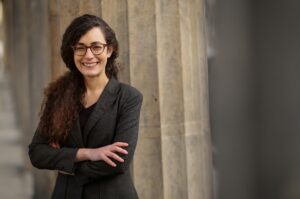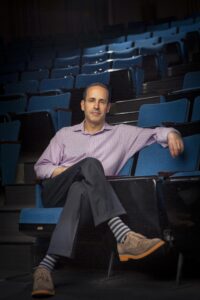Dos kol fun yisroel
Prologue. (The Book of the Diaspora) Israel’s historic enemies, beginning with Pharoah, appear one after another in their respective periods, and each briefly recites the story of his attempt to annihilate Israel.
Act I. The British Office of Criminal Investigation in Jerusalem. Barzilai, an underground fighter, is being questioned by Major Henderson as to the whereabouts and identity of the Haganah and Irgun leaders, and the heads of the unauthorized immigration in a section of the Plain of Sharon. Captain Galski, a spy, informs Major Henderson that an American-born Jew, Nathan Ometz and his sons, Gabriel and Joseph, are the leaders of the “illicit traffic.” The Major, whose life was saved by Gabriel Ometz, at the battle of El-Alamein, would like to prevent the arrest of his friends by his vicious superior, Colonel Howler. When the Colonel arrives and finds out, he demands that Galski secure proof which would destroy the ringleaders and the band. Howler employs cruel methods to wrest information from Barzilai, but only succeeds in enraging him.
Outside the house of Nathan Ometz in Miklat Yom (Refuge by the Sea), a settlement in Sharon. The deranged Malka, rescued from Hitler’s gas chambers, urges orphaned Galela, similarly rescued, to write down Malka’s tragic experiences in Poland under Hitler. Malka symbolizes the horror of the destruction of European Jewry and the tragedy of the remnant.
Nathan’s younger son Gabriel and his fiancée, Zamira, are depressed by the interminable Lake Success deliberations over the Palestine issue. Gabriel’s endless rescue work and his war experiences have badly affected his heart. He is about to go on a mission. Aware of the gravity of his ailment, Zamira seeks to restrain him and pleads that they marry without further delay. A representative of the Associated Press arrives to interview Ometz. Two decades before he had turned his textile plant in New Jersey over to his workers settled in Palestine with his four sons. He lost two sons in the struggle for independence, but unshaken he carried on. He is now the mayor of Miklat Yom. Nathan opposes political terrorism and strives to live in peace with his Arab neighbors; Sheikh Khalil and his son Ragheb are among Nathan’s best friends, but politics and British propaganda makes friendship between Arabs and Jews difficult. When the news arrives that the UN has voted for a partition leading to a Jewish state, the great tidings are too much for Gabriel’s ailing heart and he succumbs as he dances. Nathan covers Gabriel’s body with a flag, and, suppressing his sorrow, asks the young pioneers to honor the hero with a salvo of guns.
Act II. Arab bands attack Jewish settlements and Sheikh Khalil’s younger son Jamal, a follower of the Mufti, attacks Miklat Yom. The attack is repelled. Zamira mourns Gabriel, and in her dreams he urges her to marry his brother and jointly continue to fight for liberation. Nathan, who fears losing his last son, pleads with Zamira to marry Joseph so that he might see at least one of his sons get married. Zamira agrees. Miklat Yom is cut off from all the surrounding settlements, the roads are mined and the telephone wires cut, Sheikh Khalil and his son Ragheb manage to reach the settlement to seek protection from their unfriendly compatriots who threaten their lives. Nathan receives them with open arms. Through a secret radio, news reaches the settlement that England is beginning to evacuate the country and that Moshe Shertok has flown to Tel Aviv with an important message from Secretary of State Marshall. Nathan encourages the defenders to stand fast and arranges a hurried wedding ceremony for Zamira and Joseph before they set out to fight against the Arab bands. During the ceremony, Colonel Howler, Major Henderson and Captain Galski, as well as Sheikh Khalil’s son Jamal, burst in. Colonel Howler demands the surrender of the hidden arms. Nathan refuses. He accuses Howler of trying to expose them to utter destruction by rendering them defenseless. Captain Galski suggests the smashing-up of the colony. Kalman, a young defender whose parents perished in the gas chambers, shoots Galski. Jamal promptly shoots Kalman and Colonel Howler approves. Howler orders that the settlers be arrested and sent to Latrun. Major Henderson accuses Howler of sadism and of disgracing the British uniform. He maintains that Lord Balfour was sincere when he issued his declaration for a Jewish National Home but due to the evil policies of the British Colonial Office and its faithful Howlers, England must now abandon Palestine in disgrace. Howler orders Henderson’s arrest and tells the arrested settlers to raise their hands or be shot. When they do not obey the order, Nathan urges his son and the others to obey because they can still use those hands for the liberation of the Jews. At this moment the zooming of an airplane is heard and leaflets begin to fall, proclaiming the creation of the state of Israel.
Synopsis adapted from a Yiddish Art Theater program by Sonia Gollance.

